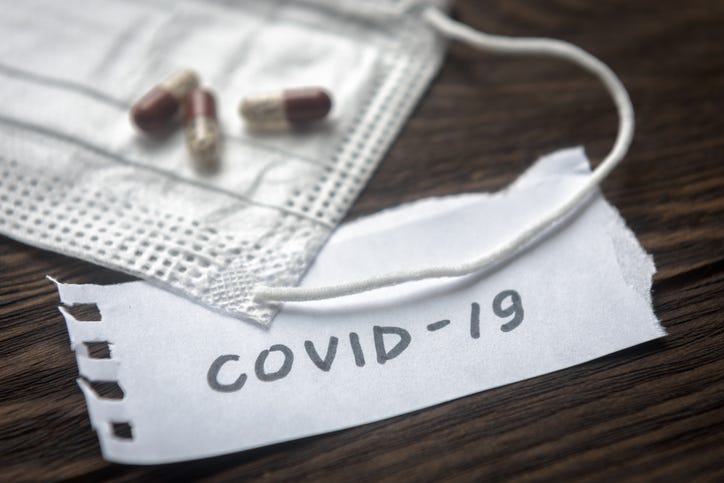
(WWJ) Tens of thousands of Michiganders are now deemed survivors of the coronavirus.
The Michigan Department of Health and Human Services is reporting 22,686 people are considered recovered from COVID-19 after surviving 30 days post diagnosis. This number includes all people who tested positive for the virus on or before April 8.
The recovery numbers now account for the nearly 2,000 people diagnosed on Michigan’s peak day for new infections, April 2nd.
22,686 is about one thousand less than half of the state’s overall confirmed cases.
Michigan’s total stands at 46,756 cases and 4,526 deaths. That accounts for 430 new cases since Saturday, and 133 newly reported deaths.
The Michigan Department of Health and Human Services said 67 of those deaths happened days or weeks ago. They were newly identified through the Michigan Disease Surveillance System (MDSS).
The fatality rate of known cases in Michigan is 10%.
However, during the early days of the pandemic, only people who were hospitalized, at-risk, or suffering severe symptoms had access to testing. Health officials say this could skew the overall fatality rate higher.
The average age of the Michiganders who have lost their life to the virus is 75 years old. The median age is 76. The age range is 5 to 107 years old.
You can see a complete breakdown of cases and fatalities by gender, race, and age here.
Southeastern Michigan contains the highest number of total cases. Wayne (including the City of Detroit), Oakland, and Macomb County combined are home to nearly 70% of the state's total cases.
Still, health officials say all parts of the state are making great strides in curtailing the pandemic.
“This is because…of all the actions the people and businesses of Michigan have taken to make sure we flatten our curve,” Governor Gretchen Whitmer said during Thursday’s press conference.
Detroit, the city hit hardest by COVID-19 with 9,737 residents testing positive, reported just 34 new cases Saturday. This is the lowest number of new daily infections since early March with only one exception.
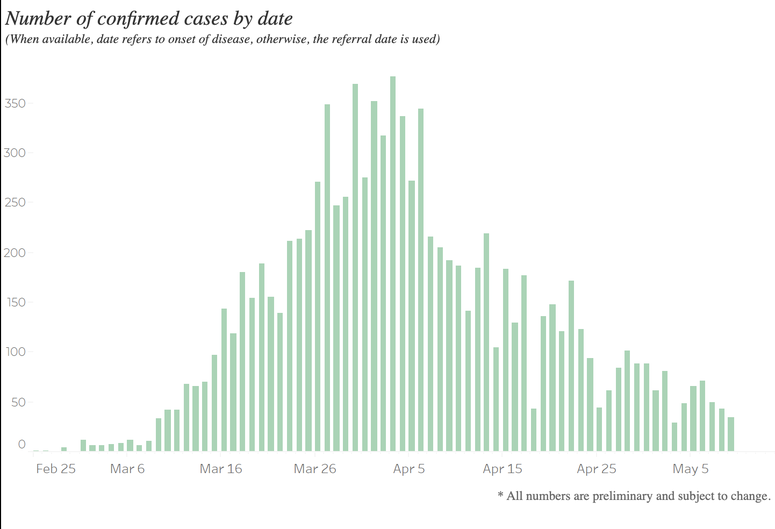
This chart shows the number of daily deaths in Detroit. 1,181 Detroit residents have died from the virus.
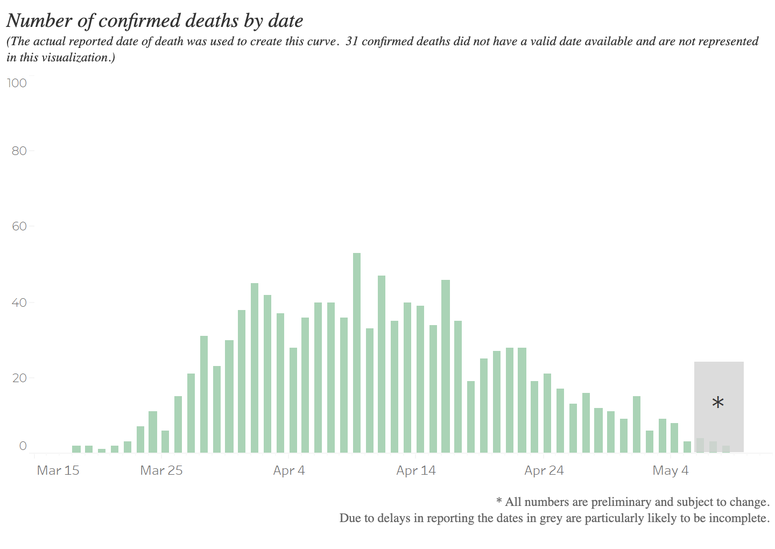
The 1,000 bed TCF Center field hospital closed Thursday after discharging its last patient.
During Thursday’s press conference on Detroit's response, Mayor Mike Duggan called the closure of the field hospital “a point of great celebration in the community” and a “remarkable accomplishment."
“At the time it opened (on April 10th), we were on a straight line up, and it was a very reasonable conclusion we were going to need 1,000 more hospital beds than our hospitals could handle,” Duggan said. “And had Detroit been a lot like other cities in the country and the trend line had continued up, we would have needed them. But they dropped almost immediately.”
Duggan said that drop was because the “people of this city did something remarkable.”
Oakland County reported 0 new cases as of 11:30 am Saturday, and one new death. This is the smallest number of new cases since before the county started tracking their daily coronavirus cases on March 12.
You can see the rolling seven-day average of cases in Oakland County below.
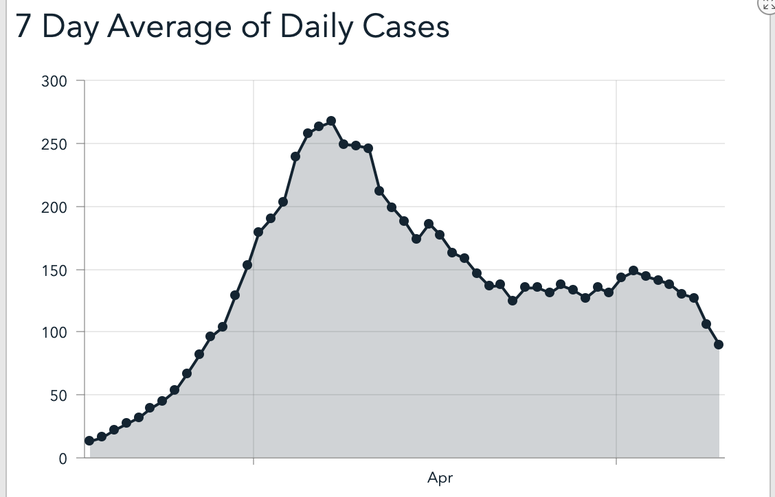
This is the rolling seven-day average of deaths in Oakland County. 838 residents of the county have died in total, out of 7,708 confirmed cases.
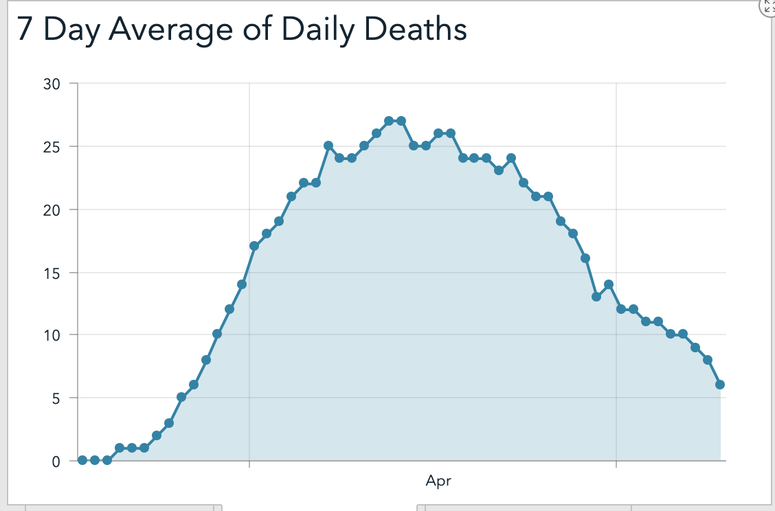
Health officials were concerned about a possible outbreak in the Grand Rapids area (Clare, Ionia, Isabella, Kent, Lake, Mason, Mecosta, Montcalm, Muskegon, Newaygo, Oceana, Osceola and Ottawa counties.)
However, the infection rate per one million residents is trending downward.
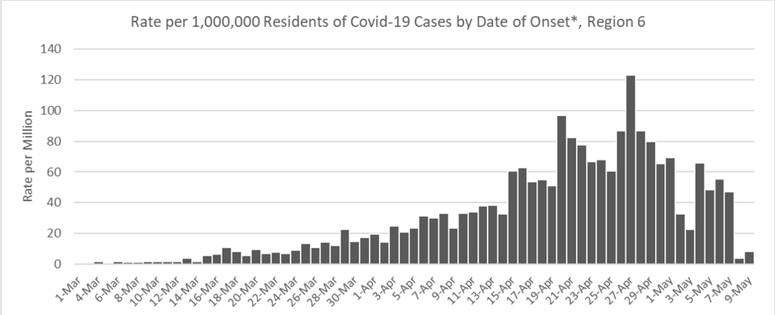
Governor Gretchen Whitmer and numerous health experts agree that the cases would likely start going up again if residents stop being careful.
"It's terribly important we do not let our guard down now," Whitmer said. "...COVID-19 is still present and can grow if we don't continue to be vigilant."
The CDC said most people who contract coronavirus have mild illness and can recover at home. People over 60 and individuals with pre-existing conditions are at higher risk for complications, according to the CDC. This includes cancer, stroke, asthma, hypertension, immunocompromised, lung disease, diabetes, heart disease and obesity (Body Mass Index above 40). You can see a complete list here.
The pre-existing conditions of Michigan’s fatalities and hospitalized cases are not known.
However, a recent study published in the Journal of the American Medical Association found a high prevalence of co-morbidities among patients hospitalized with the coronavirus in New York City, the epicenter of America’s outbreak. The study found 94% of the 5,700 patients studied had at least one chronic health condition, and 88% had two or more.
Health experts continue to learn more about how the virus behaves in the body each day. The long-term effects of this disease are also still unknown.
“The one thing we do know about COVID-19,” New York Governor, Andrew Cuomo, said in a press conference on Friday, “There is there still so much we don’t know.”
Health experts urge you to wear a cloth mask or face covering, wash your hands frequently for at least 20 seconds, abide by social distancing, and to be especially careful around loved ones in your life considered “at risk.”
Despite the uncertainty; many of Michigan's political leaders and health officials say hope is on the horizon.
Chief Medical Executive, Dr. Joneigh Khaldun, said Michigan's rolling seven-day average of cases is down 15% since last week.
“And we’re seeing another positive sign,” Khaldun said during Thursday's press conference, “The percent of those who are testing positive is declining significantly. Overall, since this outbreak started, about one in five people who were tested was positive for the virus. In recent weeks, that has actually dropped to one in ten.”
